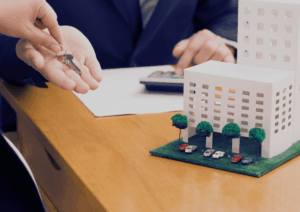
From our perspective as Charlotte property management experts, we can tell you that apartment complex investments offer a compelling opportunity for both stable returns and long-term growth. If you’re not already investing in apartments, now might be a good time to start.
We have talked about investing in apartments before, but today we want to focus on one of the most important benefits to this type of acquisition. It’s more than simply acquiring multifamily properties. It’s more than multiplying cash flow and limiting vacancy risk.
It’s an excellent way to diversify your portfolio.
Smart investors who intentionally diversify their holdings with apartment complexes will enjoy all of the benefits and advantages that come with apartment complex investments.
Let’s talk about how real estate investors can effectively diversify their portfolios through apartment complex investments and why doing so is a smart move now and in the coming years.
Why Apartment Complexes?
How did apartment complexes become such a valuable asset for real estate investors in the first place? Here’s a reminder of what they can do for you:
- Reliable Income. Multifamily properties often produce consistent rental income, even during economic downturns.
- Scalability. Owning a 20-unit complex is often easier to manage and more cost-effective than owning 20 single-family homes.
- Tax Benefits. Investors may enjoy depreciation, mortgage interest deductions, and other tax advantages.
- Growing Demand. With rising home prices and urbanization trends, the demand for rental housing, especially well-located apartments, continues to grow.
An apartment complex gives you more tenants to manage and space to cover. But each unit produces its own income, protecting you from the risk of vacancy. And, you’ll use basic unit economics to leverage better deals on preventative maintenance, turnovers, and property management.
Making the Case for Diversifying a Real Estate Portfolio
Diversifying a real estate portfolio is a critical strategy for reducing risk and building long-term investment success. For rental property owners, diversification means spreading investments across different property types, locations, and tenant profiles. This approach offers a layer of protection against market volatility, economic shifts, and unexpected downturns that might impact one sector or region more than others.
When a portfolio is concentrated in a single property type and location, such as single-family homes in one neighborhood, a downturn in that local area can significantly impact rental income and property values. Diversification mitigates that risk.
Owning a mix of single-family homes and small apartment buildings across several different parts of Charlotte’s metro area, for example, can stabilize income streams. If one market experiences a slowdown, others may continue to perform well.
Tenant diversification also plays a role. The tenants who want to rent a single-family home are looking for space and privacy. They want the experience of owning a home without having to buy it. Tenants looking for apartments might prefer to be part of a community. They’re likely to want a low-maintenance lifestyle that doesn’t include taking care of a lawn. They want affordability and value.
Apartments can appeal to a broad mix of tenants, including families, students, remote workers, and retirees. When you diversify into apartment complex acquisitions, you’re also opening up your properties to a larger pool of tenants.
Additionally, diversification opens the door to new opportunities. Different markets and asset types often move on different cycles. A well-diversified investor can capitalize on growth in one area while another stabilizes or recovers. Ultimately, a diverse portfolio that includes apartment complexes enhances financial resilience, supports steady cash flow, and positions investors for sustained growth. It’s a strategic move for those serious about growing their portfolios.
What to Look for in an Apartment Complex
When evaluating an apartment complex as a real estate investment, there are several key factors that can determine whether a property will generate consistent income, appreciate in value, and meet long-term investment goals. Careful due diligence is essential before making a purchase.
- Location and Neighborhood Trends
The location of the apartment complex is one of the most critical factors in its success. A desirable location is close to employment centers, schools, public transportation and highways, and amenities. These things attract stable, long-term tenants. Investors should also examine neighborhood trends: Is the area growing? Are new businesses or infrastructure projects underway? Look for signs of increasing demand and improving property values, which can drive both rental income and equity growth.
- Property Condition and Age
The physical condition of the building is another major consideration. Older properties may have charm or historic value but could require expensive upgrades, such as replacing roofs, plumbing, or electrical systems. A professional inspection can identify potential repair costs, which should be factored into your investment analysis. Newer buildings might carry a higher purchase price, but they usually offer fewer maintenance headaches and may attract higher-paying tenants.
- Occupancy Rates and Rental Income
Review current occupancy rates and the rent roll to understand how well the property is performing. A high vacancy rate might signal problems with management, pricing, or location. Compare current rental rates with market rents in the area. If rents are under market, there may be room to increase income with improvements or better marketing.
- Expenses and Cash Flow
Analyze all operating expenses, including property taxes, insurance, utilities, maintenance, and management fees. Subtracting these from rental income will provide a clearer picture of cash flow. A property with strong cash flow can weather economic downturns and generate reliable income over time.
- Value-Add Opportunities
Many investors look for “value-add” properties, which offer opportunities to increase income or reduce expenses. This could mean renovating units, adding amenities like laundry facilities or covered parking, or improving curb appeal. Even modest improvements can justify rent increases and boost the property’s overall value.
Choosing the right apartment complex takes more than just spotting a good price. Smart investors evaluate the whole picture, ensuring the asset aligns with their investment strategy and financial goals.
 We know that looking towards apartment complex investments can feel challenging for investors who have never owned such a building before. That’s where expert property management can make a big difference. We’ll show you how it’s done, and support you throughout the entire investment and management process. Contact us at AM Realty.
We know that looking towards apartment complex investments can feel challenging for investors who have never owned such a building before. That’s where expert property management can make a big difference. We’ll show you how it’s done, and support you throughout the entire investment and management process. Contact us at AM Realty.
